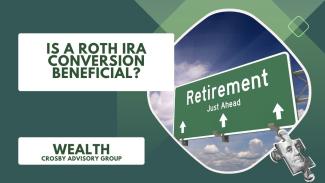
Is a Roth IRA conversion beneficial?
Everyone has heard of an IRA, Roth IRA, 401(k) and 403(b) but what do they really mean for you? As we move closer to the golden age, we must make some choices when it comes to our wealth and how it is managed. IRAs are one of the most common and best-practiced wealth-building tools across the nation, and we are here to help navigate how they can be used and the benefits of choosing one over the other.
An IRA (Individual Retirement Account) is an investment tool that is used to build wealth for individuals as they move toward retirement. There are 2 different types of IRAs:
- Traditional IRA: Taxed on money when you take it out.
- Roth IRA: Taxed on inputs, will be tax-free upon taking it out.
When considering a potential conversion from a Roth IRA to a Traditional IRA, there are pros and cons to each outcome.
Converting a Traditional IRA to a Roth IRA
With conversions, the early withdrawal fee will not apply. The only fees that you as an individual will have to worry about is the income tax bracket that you may be catapulted into, as depending on the status of the account it could put you into a higher tax bracket. Be aware of your new income level that your transferred IRA will put you in at the time. Here are a few things to consider when making the move from Traditional IRA into a Roth IRA:
- You must wait a minimum of 5 years before making any withdrawals from the newly converted Roth IRA account to avoid paying the 10% penalty
- Keep in mind that traditional IRA’s have a required minimum distribution (RMD) which require you to take a set amount out at and above the age of 72.
- There is no required RMD for Roth IRAs at the time but beginning in 2024 RMD’s will no longer be required for Roth 401 k accounts.
- If you make over a certain threshold amount, then you will be unable to put any contributions towards a Roth IRA. This threshold is a Modified
- Adjusted Gross Income (MAGI) of $228,000 if you are married filing jointly and if you file separately then your cut off is $153,000 in 2023.
- If you are expecting to be in a higher tax bracket when you are retired, it may be beneficial to convert to a Roth IRA due to the upfront tax cost of converting to a Roth may be less than the tax cost over the rest of your retirement.
IRAs don’t have to be as confusing as they may seem. With our trusted team of qualified advisors, we make it easy to set up and manage these accounts with little to no work from you. Contact us today to get started!

